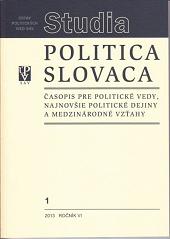„Sociálny kapitál“: kritická perspektíva a nachádzanie optimálnej signifikancie
“Social capital“: a critical perspective and a quest for optimum significance
Author(s): Ján RumanSubject(s): Politics / Political Sciences
Published by: Ústav politických vied Slovenskej akadémie vied
Keywords: “social capital”; networks; modernity; welfare state; social rights; memory
Summary/Abstract: “Social capital” has nowadays become a fashionable term, as well as a tool of the theoreticians trying to describe certain consequences of social changes within civil societies and then to apply it as an indicator of stability, social cohesion, integrity, solidarity and cooperation. The author of this study deals with the genesis of the concept, starting with the specific historical moment of its first application up to the contemporary Czech and Slovak enriching way of viewing the subject. In connection with the genesis of the concept the author outlines three main representatives - Bourdieu, Coleman and Putnam - who by means of their researches contribute to its formation most markedly. He also tries to map the general characteristics of this concept - to aptly express its definition, nature, role and function. The author as well pays attention to the causal connections of the concept formation and to its subsequent application, stressing the questions of relevance and significance of the whole concept. In conclusion, the author focuses on the critical-reflexive view of the subject matter and on the finding of adequate approaches that would enable an optimal accumulation and cultivation of “social capital”. The author, inspired by an approach developed by Czech historian D. Třeštík and by his terminological enrichment of the topic, comes to the conclusion that the term and concept themselves do have their justification and are relevant objects of analysis.
Journal: Studia Politica Slovaca
- Issue Year: VI/2013
- Issue No: 1
- Page Range: 24-40
- Page Count: 17
- Language: Slovak

